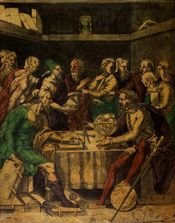|
|
You are not currently logged in. Are you accessing the unsecure (http) portal? Click here to switch to the secure portal. |
Nicholai de Toblem
| Nicholai de Toblem | |
|---|---|
| Born | 14th century Eybenstock, Germany(?) |
| Occupation | Fencing master |
| Influenced | |
Nicholai de Toblem (Nicholai de toblem mexinensis diocesis) was a 14th century fencing master of uncertain nationality. The only sure record of his existence comes from the introduction to the Pisani Dossi manuscript of Fiore de'i Liberi's fencing manual, The Flower of Battle. Fiore states that his principal teacher among the many German and Italian masters he studied with was Johannes Suvenus, who was himself a student of Nicholai of Toblem, from the "Mexinian diocese".[1]
The meaning of "mexinensis diocesis" has vexed scholars for over a century now. In 1902, Francesco Novati chose to translate it as "from the diocese of Metz", but there is no evidence that Metz ever used that latin form, and there is no town called Toblem in its vicinity. More recently, it has been speculated that Nicholai may be the master Nicolay de Eywenstock mentioned in the Codex 5278;[2] Eybenstock is about 60 miles from Döbeln, Germany, and both are well within the 14th century boundaries of the diocese of Meißen. This seems to be supported by the fact that the 5278 includes an anonymous fencing manual similar in many respects to Liberi's treatise but far from identical, which may therefore have been the work of another master in his tradition. Yet a third possibility is that Nicholai was from the diocese of Messina in Sicily. Messina is farther geographically from Liberi's home region of Friuli than is Meißen, but there is evidence that the term "mexinensis" was used in reference to the city.[3]
References
- ↑ Liberi, Fiore de'i. Flos Duellatorum [manuscript]. Pisani Dossi MS. Italy: Private Collection, 1410. f 1r.
- ↑ Folio 1r, "Liber maigistri nicolay de eywenstock"; see Jens P. Kleinau. "1428 The earthquake and the duel in the Codex 5278". Hans Talhoffer ~ as seen by Jens P. Kleinau. Retrieved 2014-24-07.
- ↑ Johannes de columna qui fuit archiepiscopus mexinensis anima cuius requiescat in pace ("Johannes of Columna, who was Archbishop of Messina, may his soul rest in peace"). See Archivio della Società romana di storia patria, Volume 8. Rome: Società romana di storia patria, 1885. p 229.

